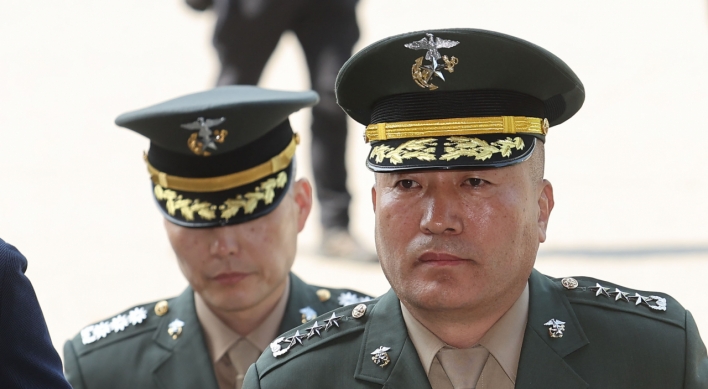Relocated ministers in Sejong City faced with poor work efficiency
By Korea HeraldPublished : May 13, 2013 - 20:45
SEJONG (Yonhap News) ― Most official schedules of heads of government ministries and agencies relocated here have been executed outside this administrative city, data showed Monday, highlighting the still-poor work efficiency caused by the long commuting distance and lack of proper infrastructure to support daily work.
Under the capital relocation plan first suggested by then presidential candidate Roh Moo-hyun in 2002, the government is seeking to move dozens of its offices and public organizations to this city in phases by the end of 2014. This is part of efforts to promote balanced regional development and ease overpopulation in Seoul.
Last December, as its first-phase action, about 5,000 officials from government ministries including the finance ministry, the agriculture ministry, the transportation ministry and the Fair Trade Commission moved to their new offices in the Sejong Government Complex, located about 150 kilometers south of Seoul.
According to government data, the heads of the five ministries and agencies currently operating here have had a combined 164 public and official schedules since their inauguration.
Of the total, 141 cases or 86 percent occurred outside Sejong, with 110 schedules being carried out in Seoul, the data showed.
Just 23 schedules or 14 percent took place in the administrative city.
The policymakers had to spend more time in Seoul to join consultations with officials of the presidential office and coordinate policy directions with lawmakers of the National Assembly. The two organizations remain in Seoul as they were excluded from the capital relocation plan.
The long distance and lack of infrastructure including video conference equipment are also cited as yet more reasons for such work inefficiency facing many high-ranking government officials, observers noted.
In particular, since his inauguration about 50 days ago, Finance Minister Hyun Oh-seok has stayed in Sejong for just one out of 48 official schedules ― a press briefing on an extra budget plan last month. He was in Seoul for 42 cases or 88 percent of official duties during the cited period.
The Seoul-staying ratios for the transportation minister and the agriculture minister stood at 52 percent and 58 percent. The ratios of the maritime minister and the head of the Fair Trade Commission were 64 percent and 62 percent, the data showed.
“While the presidential office of Cheong Wa Dae, the National Assembly and the focus of most economic affairs still remain in Seoul, only the economy-related ministers came down here, which makes it inevitable that they have to juggle two different work schedules,” a government official said.
“In this process, there are many cases in which they have to waste much of their time on the road,” he added. “It is urgently necessary to come up with measures to ease this side effect (of moving to this administrative city).”
Under the capital relocation plan first suggested by then presidential candidate Roh Moo-hyun in 2002, the government is seeking to move dozens of its offices and public organizations to this city in phases by the end of 2014. This is part of efforts to promote balanced regional development and ease overpopulation in Seoul.
Last December, as its first-phase action, about 5,000 officials from government ministries including the finance ministry, the agriculture ministry, the transportation ministry and the Fair Trade Commission moved to their new offices in the Sejong Government Complex, located about 150 kilometers south of Seoul.
According to government data, the heads of the five ministries and agencies currently operating here have had a combined 164 public and official schedules since their inauguration.
Of the total, 141 cases or 86 percent occurred outside Sejong, with 110 schedules being carried out in Seoul, the data showed.
Just 23 schedules or 14 percent took place in the administrative city.
The policymakers had to spend more time in Seoul to join consultations with officials of the presidential office and coordinate policy directions with lawmakers of the National Assembly. The two organizations remain in Seoul as they were excluded from the capital relocation plan.
The long distance and lack of infrastructure including video conference equipment are also cited as yet more reasons for such work inefficiency facing many high-ranking government officials, observers noted.
In particular, since his inauguration about 50 days ago, Finance Minister Hyun Oh-seok has stayed in Sejong for just one out of 48 official schedules ― a press briefing on an extra budget plan last month. He was in Seoul for 42 cases or 88 percent of official duties during the cited period.
The Seoul-staying ratios for the transportation minister and the agriculture minister stood at 52 percent and 58 percent. The ratios of the maritime minister and the head of the Fair Trade Commission were 64 percent and 62 percent, the data showed.
“While the presidential office of Cheong Wa Dae, the National Assembly and the focus of most economic affairs still remain in Seoul, only the economy-related ministers came down here, which makes it inevitable that they have to juggle two different work schedules,” a government official said.
“In this process, there are many cases in which they have to waste much of their time on the road,” he added. “It is urgently necessary to come up with measures to ease this side effect (of moving to this administrative city).”
-
Articles by Korea Herald



















